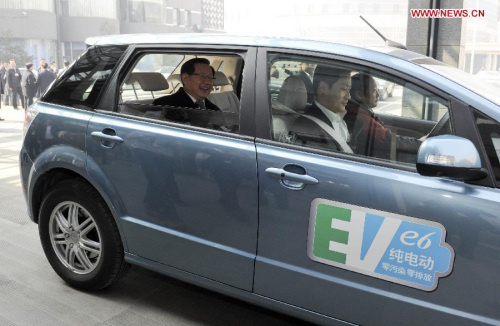
Wan Gang (L), the minister of science and technology, takes an electric vehicle (EV) to leave after a panel discussion in Beijing, capital of China, March 7, 2013. The minister said to reporters that zero-emission electric vehicles had been sold in Chines
Chinese Minister of Science and Technology Wan Gang, who has championed the research and development of new engery vehicles for decades, didn't miss a chance to promote the new industry.
During China's annual legislative session, Wan abandoned his official sedan and took a small electric car instead as commuter vehicle.
The silver electric vehicle (EV), with a slogan "zero-pollution, zero-emission" posted on the car body, carried Wan back and forth between the conference venue, his office and the media center.
"Colleagues of the ministry are more willing to take EVs, as every kilometer they travel means a reduction of PM2.5 emission, compared with gas vehicles," Wan told a press conference on Thursday on the sidelines of the annual session of National People's Congress, China's top legislature.
Wan spent 10 years from 1991 as an auto engineer in the research and development of new energy vehicles for the Audi Corporation in Germany.
By the end of 2000, Wan returned home at the invitation of the Ministry of Science and Technology and was appointed chief scientist and group leader of a key national electric vehicle project.
In April 2001, he began to work in Tongji as director of the center of new fuel automobile. Four months later, he became Assistant President of Tongji. In July 2004, Wan was promoted to president of the university.
In 2007, Wan, a non-Communist party member, was appointed the country's minister of science and technology.
China started promoting new energy vehicles in 2009, with public transportation as a pilot zone.
By last year, there were 27,800 new energy vehicles in the country's 25 cities, and 80 percent of them were buses, figures showed. The number is expected to reach 39,000 by the end of this month, according to Wan.
Many cities have been encouraging residents to buy new energy vehicles to help reduce air pollution.
In Beijing, new car buyers have to obtain license plates through a monthly plate lottery. However, those who buy electric cars will not have to enter the lottery due to a series of preferential policies for new energy vehicles that will be rolled out in the first half of 2013.
Subsidies are offered to private buyers of new energy vehicles, but Wan said this is only being adopted for now, and a more coordinated development will be needed in the long run.
"Such coordinated development needs a combination of charging facilities, environmental protection measures, industrial development policies and efforts of power sectors," he said.
Read more:

Copyright ©1999-2011 Chinanews.com. All rights reserved.
Reproduction in whole or in part without permission is prohibited.